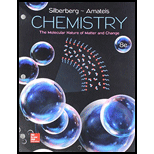
Concept explainers
(a)
Interpretation:
The formula and molecular mass of sodium dichromate are to be determined.
Concept introduction:
The molecular formula of a compound is a representation which suggests the total number of atoms of each element the compound is made of.
The molecular mass of a compound is defined as the sum of the atomic masses of all the atoms present in it.
The general formula to calculate the molecular mass of a compound is,
(a)
Answer to Problem 2.103P
The molecular formula for sodium dichromate is
Explanation of Solution
Dichromate is a polyatomic ion. The formula for the dichromate ion is
Hence the molecular formula for sodium dichromate becomes
The formula to calculate the molecular mass of
Substitute
The molecular formula for sodium dichromate is
(b)
Interpretation:
The formula and molecular mass of ammonium perchlorate are to be determined
Concept introduction:
The molecular formula of a compound is a representation which suggests the total number of atoms of each element the compound is made of.
The molecular mass of a compound is defined as the sum of the atomic masses of all the atoms present in it.
The general formula to calculate the molecular mass of a compound is,
(b)
Answer to Problem 2.103P
The molecular formula for ammonium perchlorate is
Explanation of Solution
Ammonium and perchlorate are polyatomic ions. The formula for the perchlorate ion is
Hence the molecular formula for ammonium perchlorate phosphate becomes
The formula to calculate the molecular mass of
Substitute
The molecular formula for ammonium perchlorate is
(c)
Interpretation:
The formula and molecular mass of magnesium nitrite trihydrate are to be determined
Concept introduction:
The molecular formula of a compound is a representation which suggests the total number of atoms of each element the compound is made of.
The molecular mass of a compound is defined as the sum of the atomic masses of all the atoms present in it.
The general formula to calculate the molecular mass of a compound is,
(c)
Answer to Problem 2.103P
The molecular formula for magnesium nitrite trihydrate is
Explanation of Solution
Nitrite is a polyatomic ion. The formula for the carbonate ion is
Magnesium belongs to the
While naming compounds containing polyatomic ions, when two or more of the same polyatomic ion are present, the ion appears in parentheses. The total number of the polyatomic ion is written as a subscript outside the parentheses.
In magnesium nitrite, two nitrite polyatomic ions associate with one magnesium ion. Hence the molecular formula becomes
Magnesium nitrite trihydrate is the hydrated form of the ionic compound magnesium nitrite. Upon hydration, the molecule of magnesium nitrite bonds with three molecules of water to form a trihydrate molecule. In the molecular formula, the water molecules are shown after a centred dot. Hence the formula for magnesium nitrite trihydrate becomes
The formula to calculate the molecular mass of
Substitute
The molecular formula for magnesium nitrite trihydrate is
Want to see more full solutions like this?
Chapter 2 Solutions
Loose Leaf for Chemistry: The Molecular Nature of Matter and Change
- What will the enolate for this be using LDA, THF, and cold temperatures? What will it be using NaOEt at rt?arrow_forwardHelp me solve this problem.arrow_forwardDraw a mechanism for the following synthetic transformation including reagents and any isolable intermediates throughout the process. Please clearly indicate bond cleavage/formation using curly arrows. MeO2Carrow_forward
- CHEM 310 Quiz 8 Organic Chemistry II Due: Tuesday, April 25th, at 11:59 pm. This quiz is open textbook / open notes - but you must work alone. You cannot use the internet or the solutions manual for the book. Scan in your work and record an explanation of your mechanism. You may record this any way that you like. One way would be to start an individual Zoom meeting, start recording, "share your screen" and then talk through the problem. This will be converted to an .mp4 file that you can upload into Canvas using the "record/upload media" feature. Pyridine, benzoic acid and benzene are dissolved in ethyl acetate. Design and provide a plan / flow chart for separating and isolating each of these components. Pyridine and benzene are liquids at room temperature. Benzoic acid is a solid. You have ethyl acetate, 2M NaOH, 2M HCI and anhydrous MgSO4 available, as well as all the glassware and equipment that you used in the organic lab this year. Provide accurate acid/base reactions for any…arrow_forwardCan anyone help me solve this step by step. Thank you in advaarrow_forwardPlease draw the mechanism for this Friedel-crafts acylation reaction using arrowsarrow_forward
 ChemistryChemistryISBN:9781305957404Author:Steven S. Zumdahl, Susan A. Zumdahl, Donald J. DeCostePublisher:Cengage Learning
ChemistryChemistryISBN:9781305957404Author:Steven S. Zumdahl, Susan A. Zumdahl, Donald J. DeCostePublisher:Cengage Learning ChemistryChemistryISBN:9781259911156Author:Raymond Chang Dr., Jason Overby ProfessorPublisher:McGraw-Hill Education
ChemistryChemistryISBN:9781259911156Author:Raymond Chang Dr., Jason Overby ProfessorPublisher:McGraw-Hill Education Principles of Instrumental AnalysisChemistryISBN:9781305577213Author:Douglas A. Skoog, F. James Holler, Stanley R. CrouchPublisher:Cengage Learning
Principles of Instrumental AnalysisChemistryISBN:9781305577213Author:Douglas A. Skoog, F. James Holler, Stanley R. CrouchPublisher:Cengage Learning Organic ChemistryChemistryISBN:9780078021558Author:Janice Gorzynski Smith Dr.Publisher:McGraw-Hill Education
Organic ChemistryChemistryISBN:9780078021558Author:Janice Gorzynski Smith Dr.Publisher:McGraw-Hill Education Chemistry: Principles and ReactionsChemistryISBN:9781305079373Author:William L. Masterton, Cecile N. HurleyPublisher:Cengage Learning
Chemistry: Principles and ReactionsChemistryISBN:9781305079373Author:William L. Masterton, Cecile N. HurleyPublisher:Cengage Learning Elementary Principles of Chemical Processes, Bind...ChemistryISBN:9781118431221Author:Richard M. Felder, Ronald W. Rousseau, Lisa G. BullardPublisher:WILEY
Elementary Principles of Chemical Processes, Bind...ChemistryISBN:9781118431221Author:Richard M. Felder, Ronald W. Rousseau, Lisa G. BullardPublisher:WILEY





